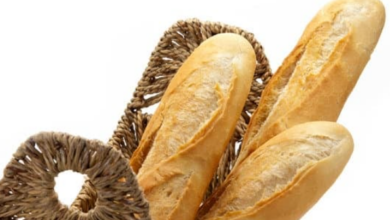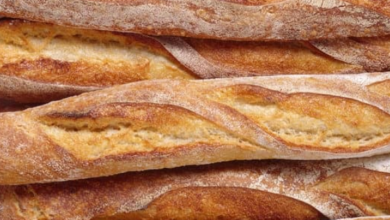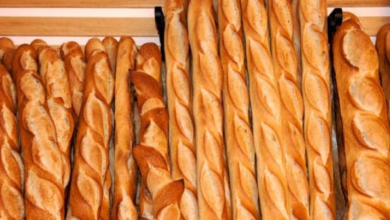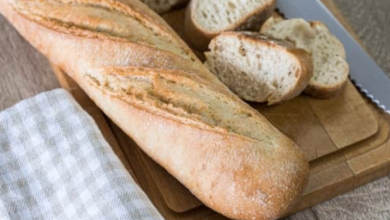Baguette: Is It a Savory Bread?

What To Know
- It is made using a simple combination of flour, water, yeast, and salt, resulting in a bread with a slightly tangy flavor and a crisp texture.
- In conclusion, the baguette is a versatile and delicious bread that offers a unique blend of savory and slightly sweet flavors.
- The crusty exterior of a baguette provides a satisfying crunch and adds a delightful contrast to the soft and airy interior.
The baguette, an elongated, crusty loaf of bread, has become synonymous with French cuisine. Its distinct shape and flavor have made it a staple in bakeries, restaurants, and homes worldwide. However, one question that often arises is whether the baguette is savory or sweet. This blog post delves into the characteristics, ingredients, and culinary uses of the baguette to provide a comprehensive answer to this culinary conundrum.
The Classic French Baguette: A Culinary Masterpiece
The traditional French baguette is characterized by its long, cylindrical shape, with a golden-brown crust and a soft, airy interior. It is made using a simple combination of flour, water, yeast, and salt, resulting in a bread with a slightly tangy flavor and a crisp texture. The baguette’s unique flavor profile is attributed to the fermentation process, which allows the dough to develop complex flavors and aromas.
Savory or Sweet: Understanding the Taste of a Baguette
The taste of a baguette is often described as savory, with a subtle hint of sweetness. This delicate balance of flavors makes it a versatile bread that can be enjoyed in various culinary applications. The crusty exterior provides a satisfying crunch, while the soft interior offers a chewy texture. The slightly tangy flavor adds a depth of flavor that complements a wide range of ingredients.
Culinary Versatility: Baguette’s Role in French Cuisine
In French cuisine, the baguette plays a pivotal role, serving as a staple accompaniment to various dishes. Its crusty texture makes it ideal for dipping into soups, stews, and sauces. The soft interior provides a perfect canvas for sandwiches, filled with savory ingredients like cheese, ham, and vegetables. Additionally, baguettes are often used to make croutons, breadcrumbs, and French toast, adding a delightful touch to various culinary creations.
Cultural Significance: Baguette as a Symbol of French Heritage
Beyond its culinary significance, the baguette holds a special place in French culture. Its elongated shape is reminiscent of a shepherd’s staff, symbolizing the importance of bread in sustaining life. The baguette is often depicted in art, literature, and film, serving as an iconic representation of French identity and culinary traditions.
Health Benefits: Baguette and a Balanced Diet
While the baguette is often perceived as a high-calorie bread, it can be incorporated into a balanced diet in moderation. The baguette is a source of carbohydrates, providing energy for the body. Additionally, it contains dietary fiber, which aids in digestion and promotes gut health. The crusty texture of the baguette also requires more chewing, leading to a feeling of fullness and satisfaction.
Takeaways: The Savory Delights of the Baguette
In conclusion, the baguette is a versatile and delicious bread that offers a unique blend of savory and slightly sweet flavors. Its crusty exterior, soft interior, and tangy taste make it a perfect accompaniment to various culinary creations. From crusty sandwiches to delectable French toast, the baguette adds a touch of French flair to any meal. Its cultural significance and health benefits further solidify its position as a beloved staple in French cuisine and beyond.
Frequently Asked Questions:
1. What is the primary flavor profile of a baguette?
The baguette possesses a predominantly savory flavor with a subtle hint of sweetness. Its tangy notes and slightly yeasty aroma add complexity to its taste profile.
2. What culinary applications best showcase the versatility of a baguette?
Baguettes are commonly used for dipping into soups and stews, making sandwiches, and creating croutons and breadcrumbs. They also serve as a base for French toast and various savory tartines.
3. How does the baguette’s crusty exterior contribute to its overall taste and texture?
The crusty exterior of a baguette provides a satisfying crunch and adds a delightful contrast to the soft and airy interior. It also helps retain moisture within the bread, resulting in a more flavorful and chewy experience.
4. Can baguettes be incorporated into a balanced diet?
Yes, baguettes can be part of a balanced diet when consumed in moderation. They provide carbohydrates for energy and dietary fiber for gut health. The crusty texture promotes a feeling of fullness and satisfaction.
5. What is the cultural significance of the baguette in French cuisine?
The baguette holds a special place in French culture, symbolizing sustenance, heritage, and culinary pride. It is often depicted in art, literature, and film as an iconic representation of French identity.





